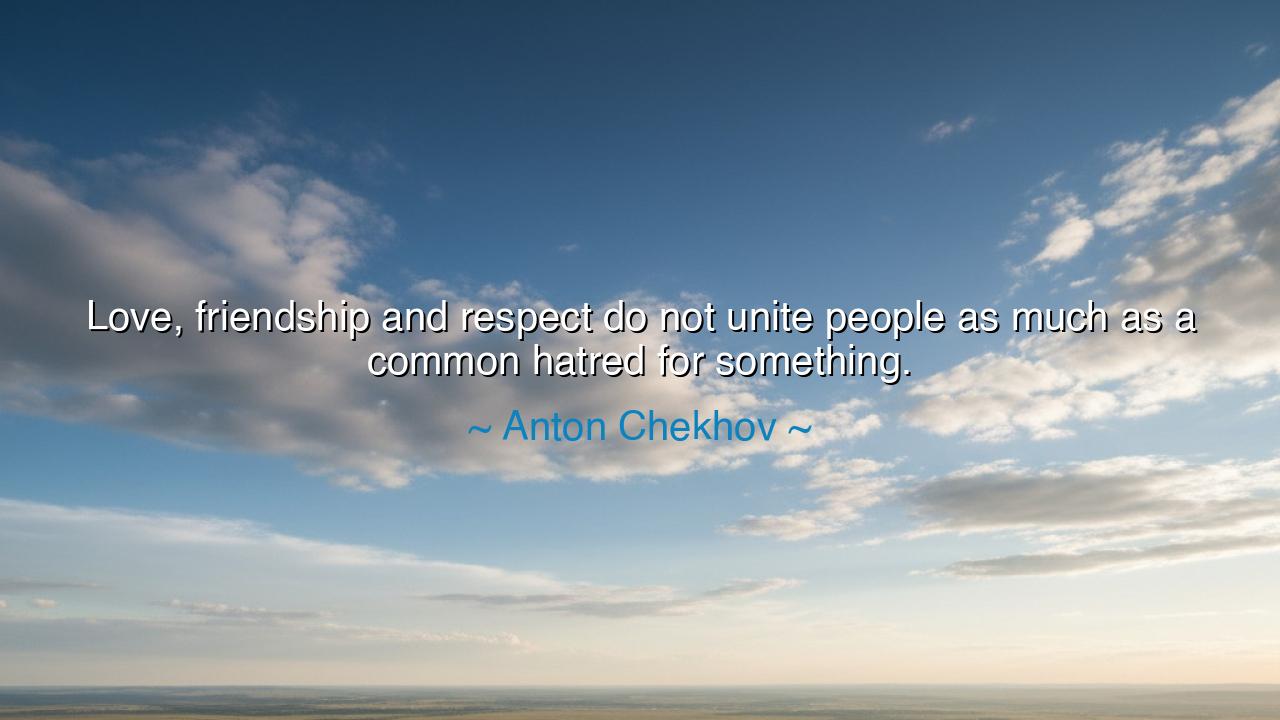
Love, friendship and respect do not unite people as much as a
Love, friendship and respect do not unite people as much as a common hatred for something.






"Love, friendship and respect do not unite people as much as a common hatred for something." Thus wrote Anton Chekhov, the master of quiet truths and the subtle anatomist of the human heart. In these words, he unveils one of the darker laws of human nature — that men and women, for all their talk of love and virtue, are often more quickly and fiercely bound together by what they despise than by what they cherish. Chekhov, who spent his life observing the delicate contradictions of the soul, knew that unity built upon goodness is fragile, but unity forged through hatred burns with a terrible intensity. Yet though it binds, it also consumes.
To understand Chekhov’s wisdom, one must look upon the long history of mankind, where the drums of conflict have so often drowned the songs of peace. When people share affection or ideals, their union is soft, luminous, and full of grace — but it requires patience and understanding. When they share hatred, however, the bond is instant and fierce. It demands no effort, no virtue, no sacrifice — only anger. Two strangers who might otherwise have nothing in common will stand shoulder to shoulder when faced with a common enemy. This is the tragic convenience of hatred: it gives even the divided a false sense of unity, born not of love, but of fear and resentment.
Consider, for example, the time of the French Revolution. In its early days, citizens of every class and calling — peasants, merchants, and philosophers alike — found themselves united not by friendship or shared vision, but by a common hatred of the monarchy and the oppression it represented. That hatred was powerful; it overthrew thrones, shattered traditions, and changed the course of history. But as soon as the object of that hatred fell, the unity dissolved. Friends turned against friends, brothers against brothers, and the Revolution devoured its own. The same fire that had once brought people together now consumed them all. Thus, Chekhov’s warning stands clear: hatred can build alliances, but never peace.
And yet, his words do not sneer at human weakness — they illuminate it. Chekhov, with his compassionate realism, reminds us that people crave belonging, and when love is difficult to find, they will cling even to anger if it gives them purpose. In a world of uncertainty, hatred is simple; it offers clarity, identity, and direction. But this is the poison disguised as comfort — for while love and respect elevate the soul, hatred enslaves it. Those who unite in hatred do not walk toward light but circle endlessly around the same fire, unable to escape its heat.
The wise of old have spoken against this. The Buddha taught that “hatred does not cease by hatred, but only by love; this is the eternal law.” And yet even now, nations, communities, and even families repeat the same tragic dance. In times of turmoil, leaders often exploit the truth Chekhov described, turning people’s frustrations toward a common enemy — an outsider, a rival, a scapegoat. For a time, unity blooms like fire — bright, intoxicating, and destructive. But once the flames die, what remains is ash, and the people are left hollow, wondering what bound them when the hatred is gone.
Yet, even in this somber truth, there lies a seed of wisdom and redemption. If hatred can so powerfully unite, imagine what love might achieve if cultivated with the same passion. Hatred is the easy bond; love, the noble one. The former unites through destruction, the latter through creation. The task, then, is not to deny humanity’s hunger for unity, but to guide it toward higher ends — to transform that raw energy into compassion, justice, and purpose. The challenge of the wise is not to burn with the crowd, but to light a gentler flame that warms rather than destroys.
Lesson: Be wary of the unity born of hatred, for it is the false friendship of the storm. True unity — the kind that endures beyond crisis — is born of love, respect, and understanding. What hatred achieves in a moment, love achieves forever.
Practical action: When you find yourself among those bound together by outrage or anger, pause and ask: What do we truly stand for, not just against? Seek out those who build rather than destroy. Share words that heal rather than divide. Let your heart be a sanctuary of calm amidst the noise of resentment. For though hatred gathers crowds, it is love, quiet and steadfast, that builds civilizations and redeems the soul of mankind.






AAdministratorAdministrator
Welcome, honored guests. Please leave a comment, we will respond soon